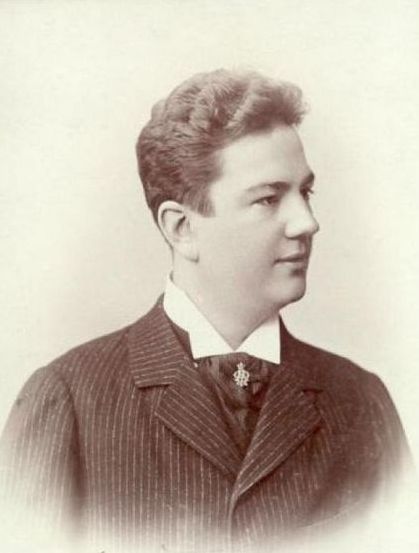- Profession: Bass, Music pedagodue
- Relation to Mahler: Worked with Gustav Mahler (1860-1911) in the Vienna State Opera
- Correspondence with Mahler:
- Born: 19-05-1872 Mulhausen, Germany.
- Died: 00-08-1931 Leipzig, Germany.
- Buried: 00-00-0000
He studied singing under Albert Goldberg in Leipzig and made his debut at the Hofoper in Dresden as Ferrando in G. Verdi’s ‘’Il Trovatore’’ (1894). Already in 1896 he appeared at the Bayreuth Festival as Fasolt and the Hunding in R. Wagner’s “Ring des Nibelungen”. Here in 1897 he sang the roles of Hunding and Gurnemanz in ‘’Parsifal’’, in 1899 the Gurnemanz. Then till 1909 he joined to the Hofoper in Dresden and then was engaged in the 1910-1911 season at the Stadttheater in Zurich.
In the 1915-1919 seasons he sang at the Opernhaus in Leipzig, where he worked later as singing teacher. In Dresden he appeared in several opera premieres: on 12-12-1896 in “Die Heimkehr des Odysseus”, on 20-03-1901 in “Nausikaa” by August Bungert, on 21-11-1901 in “Feuersnot” by Richard Strauss (1864-1949) and on 09-12-1905 in ‘’Salome’’.
He made guest appearances at the Vienna Hofoper (1902) and Berlin Hofoper (1903), at the Hofoper in Munich (1900-1902) and also appeared at London in concert under Felix Mottl.
Also Wächter.
Chronology of some appearances
1896 Bayreuth Festival
1897 Bayreuth Festival
1899 Bayreuth Festival
1900-1909 Dresden Hofoper
1910-1911 Zurich Stadttheater
1915-1919 Leipzig Opernhaus
Live and act
He attended the school in Leipzig, where his parents, the engineer Adolph Julius Carl Guardian and his wife Emma Marie Caroline, had moved from Alsace because of the father’s job. After schooling Wachter volunteer in a Leipzig business, because he should take a commercial career. After the death of the business owner and dissolution of the company, the prospective businessman orphaned professionally.
Vocal training in Leipzig
Based on his deep voice, with which he had “attracted attention as a teenager in family and club circles,” he now tried “to give her a proper education.” He became a pupil of the chamber singer and senior director of the Leipzig City Theater Albert Goldberg (1847-1905), who was also “teacher of vocal art”, and trained him to become a bassist. On 12-04-1893 began his one-year vocal training with Goldberg and on 12-04-1894, he sang in Dresden at the Court Opera for rehearsals.
Opera singer in Dresden
In Dresden, the young singer immediately got a five-year contract at the court theater. On 10 May 1894 he had his first public appearance as captain “Ferrando” in the opera The Troubadour. He then took on 19 May 1894 the role of hermit in Der Freischütz by Carl Maria von Weber and on 7 June of the same year the role of the character “Sarastro” in the opera by Wolfgang Amadeus Mozart. His excellent bass voice was promptly reported in the newspaper Neue Freie Presse in Vienna by the correspondent Paul Lindau (1839-1919), who was then living in Strehlen near Dresden (1891-1895).
Ferdinand Gleich (1816-1898) praised the special voice of Wachter in the Dresdner Anzeiger as a music critic, using the example of the role of “Sarastro” in Die Zauberflöte. Above all, F. Gleich praised how skillfully the bass recited the arias “O Isis and Osiris, which bliss!” As well as “In these holy halls” at the performance of the opera Die Zauberflöte. Also the newspaper The Journal was pleased that the court theater had “found the long-sought reputable deep bass”.
Emphasized were the “impressive strength of the sound”, his “extremely safe, precise pronunciation” as well as the “euphony” of the bass and also his voice “in medium and high pitch”. The first bassist Wachter was prized as the “ornament of the Dresden Opera” and beyond the Elbe metropolis.
Wachter was admitted to the Tonkünstler Club in Dresden in 1897/98. The opera singer performed at the public “Ninth practice evening” of this association on March 4, 1898 four “songs for a bass voice with pianoforte” for the first time. The songs were composed by Georg Pittrich after texts by four poets, including Emanuel Geibel (1815-1885), “You are so quiet”. The opera singer was musically accompanied during his performance by the composer at the piano.
Wachter sang on 07-06-1900 in the Dresden Opera for the first time Kaspar, the first hunter boy in the Freischütz. The music critic Edgar Mansfield Pierson (1848-1919) regretted in this musical lecture that the “richly talented singer” does not “serious singing and declamation studies makes.” On May 1, 1903, the bassist in the Royal Opera House in the performance of Amelia or Ein Maskenball, the opera in three acts by Giuseppe Verdi with. Other main contributors were the opera singers Irene Abendroth (1872-1932), coloratura soprano; Irene von Chavanne (1863-1938), alto and Erika Wedekind (1868-1944), soprano.
The male roles played and sang alongside the bassist Ernst Wachter the opera singer Karl Burrian (1870-1924); Tenor, Karl Scheidemantel (1853-1923) Baritone; Franz Nebuschka, (1857-1917) bass-baritone and Leon Rains (1870-1954), bass. In the premiere of the one – act opera Salome (soprano), played by chamber singer Marie Wittich (1868-1931), with the music of Richard Strauss Wachter took over the role of a “Kappadozier” (bass) under the conductor Ernst von Schuch on 09-12-1905 at the Dresden Court Opera.
Guest performance in Munich
Wachter sang at the Hofoper Munich in the period from “01-11-1900 to 01-11-1901 “with the status of a guest. His contract was extended for another year until November 1902.
Guest appearances in Bayreuth
Wachter followed several invitations to attend the festival in Bayreuth. At the Bayreuth Festival he made his debut on May 24, 1896 with Wagner’s figure Fasolt in the opera Das Rheingold and he sang in 1897 the Hunding in the opera Die Walküre and until 1899 also the Knight “Gurnemanz” in Parsifal twice.
Also in these roles, the “full harmony and the impeccable purity of his beautiful and powerful bass voice” were highlighted. Ernst Wachter’s striking bass voice was recorded in the album “100 Years Bayreuth auf Schallplatte” along with other vocals of early festival singers.



